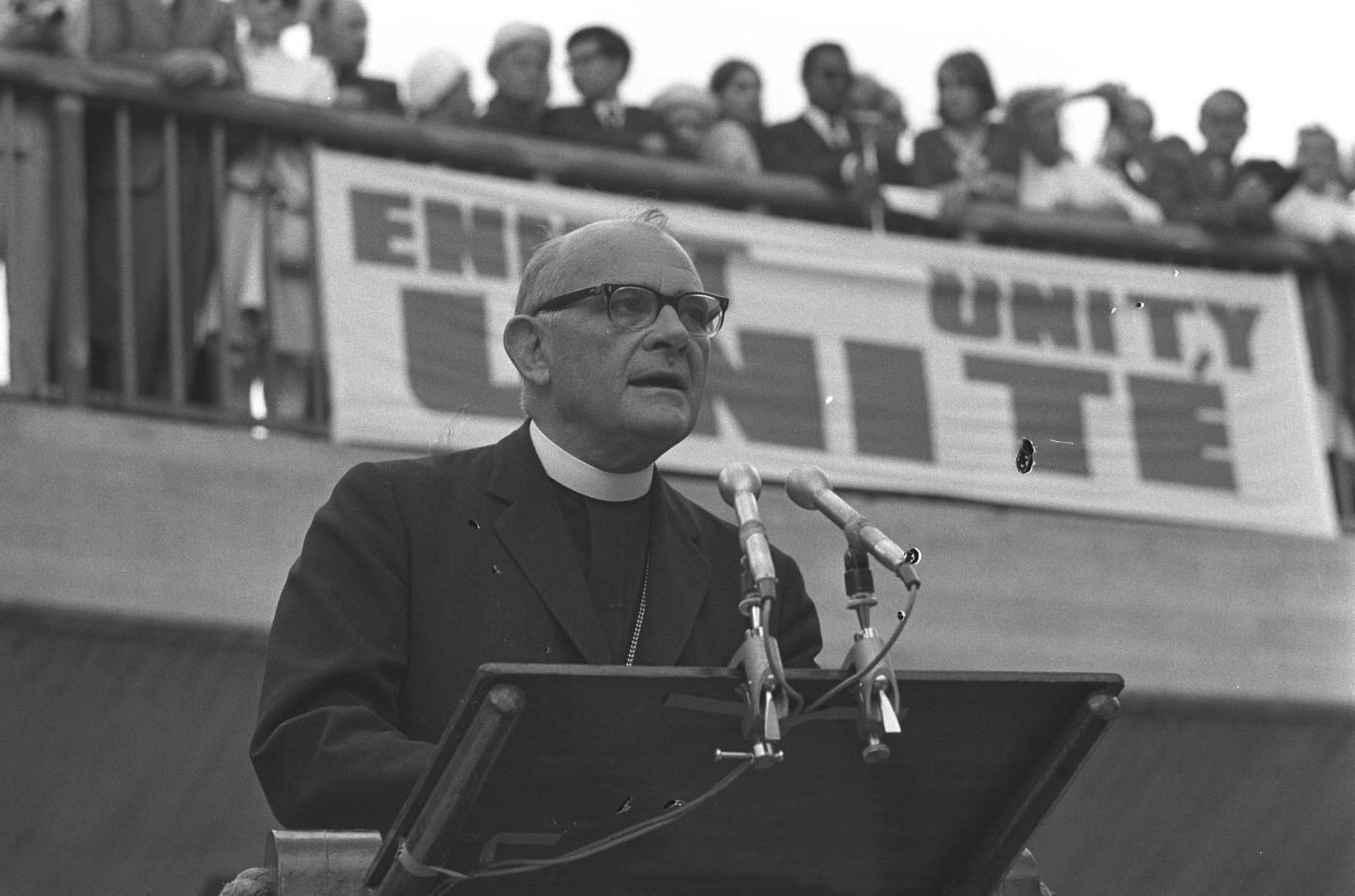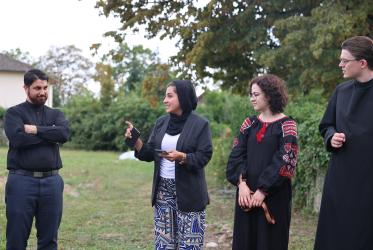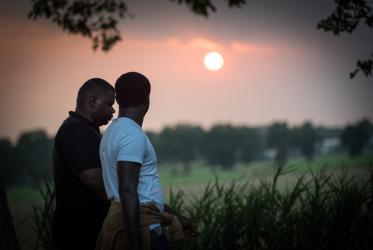By Tore Samuelsson*
Fifty years ago, Dr Martin Luther King was still planning for his sermon at the opening of the World Council of Churches (WCC) Fourth Assembly in the serene town of Uppsala, Sweden. But just three months before the assembly’s opening service, he is assassinated. His dream of a new world is, however, alive at the assembly.
Nineteen-sixty-eight is a year when dramatic political crossroads and global demands for peace and justice set the course for both the world and the ecumenical voyage. The Prague Spring in Czechoslovakia, student revolts in Paris, growing civil rights movement in the USA, Vietnam war protests, a building global anti-apartheid movement, liberation struggles in colonial states, an intensifying Cold War…
An animated political agenda, radicalized youth in the churches, and not least the “communications revolution” paved the way for a much-recalled WCC Assembly in Sweden. Never had mass communications played such a strategic role in an ecumenical event as in “Uppsala 68”. Important key messages were globally transferred with unprecedented speed.
We hosted 700 accredited journalists, recalls Jan-Erik Wikström, a Swedish publisher and member of the organizing committee, who later became minster of Education in the Swedish government. There was a great interest in our daily press briefings, although often more focused on political issues than WCC internal matters.
A broadcasted, open-air worship in the city centre of Stockholm gathered thousands of people. The well-balanced mix of contributions from WCC and Swedish churches formed Sweden’s first successful international colour-TV event. In response to pressure from youth participants, WCC leadership and the TV producer agreed to include visual protest messages, following the first ten days of heated debates at Uppsala 68.
Strong push for social responsibility
Journalist Annika Sjöqvist-Platzer, one of 300 young stewards at Uppsala 68, recalls: “I was providing material to the journalists, but as much as there was time, I dropped in at Club-68 which was open until 3 in the morning! This was where delegates and youth met, and where famous civil rights defenders and folk singer Pete Seeger performed. Influence and pressure from youth was a given during the assembly. There were tough demands for peace and justice, and a new lifestyle.”
Bishop Emeritus Jonas Jonson, acting as an informal go-between with youth and the police, recollects several incidents with demonstrators, not least negotiations when Uppsala Cathedral was occupied by youth demonstrators all night before the closing worship. “I would still challenge the popular interpretation of Uppsala 68 as politicized, and driven by radical youth,” says Jonson. “That is what the media picked up, but it did not influence decisions and final documents much. The outcome was rather a logical and concrete process in which WCC moved in the direction of increased socio-ethical responsibility. In terms of peace and justice, there is a direct line between Archbishop Nathan Söderblom, and the important ecumenical meeting in Stockholm 1925, to Uppsala 68.”
Dr George Tsetsis, participant at the assembly and senior staff in WCC for decades to come, points in the same direction: ”The agenda of Uppsala 68 was greatly influenced by the World Conference on Church and Society in Geneva 1966, convoked under the auspices of the WCC to clarify areas of Christian social concern and advise the churches on their ministry in a world undergoing revolutionary and rapid social changes.”
A living theme: “Behold, I make all things new”
No doubt, the Fourth Assembly was change-oriented and breathed its theme “Behold, I make all things new.” WCC’s first general secretary Dr W.A. Visser t’ Hooft, participating in his fourth and final assembly, set the direction as he cautioned: “A Christianity which has lost its vertical dimension has lost its salt, and it is not only insipid but useless for the world; but a Christianity which would use the vertical dimension as means to escape from its responsibility in the common life of man is a denial of the incarnation of God’s love for the world manifested in Christ.”
Uppsala 68 is recalled for the attendance of many new member churches, and for the very active Orthodox participation in an assembly. Following the Second Vatican Council 1962-65, this was also the first assembly with an active (15-member) Roman Catholic observer delegation.
Thus, the event in July 1968 gathered more attendance that any earlier assembly. More than 2,000 participants -702 delegates from 225 member churches in 80 countries - brought the world to Uppsala, the “church capital” of Sweden for 800 years, for almost three weeks. One hundred fifty of the participants were invited youth, with equal representation from all continents – an innovation. Through a pre-assembly in Uppsala, youth had good opportunities to settle in and prepare. To their dismay, however, most were not given the right to vote in the assembly as they were not official delegates from their respective churches.
The impressive international media coverage gave WCC a public face. And this was not just by chance. In the 1960s, communications expert Marshall McLuhan concluded that “media is the message”. In line with this, WCC and Swedish hosts planned for a communicative assembly, including modern art, films, new music and drama.
Christianity with power to change
In Martin Luther King’s absence, Afro-American novelist James Baldwin challenged the assembly by stating that: “Christianity still has the power to move the world if it will. It still has the power to change the structure of South Africa, to prevent the assassination of another Martin Luther King, to force my country to stop dropping bombs on southeast Asia.”
Racism, and particularly apartheid in southern Africa was one of the issues that soon after the assembly turned into concrete action as WCC’s Programme to Combat Racism (PCR) was established.
“This gave WCC recognition and a face more than anything else,” said Jonson. “And Uppsala 68 was important. It is not by coincidence that Sweden – with its rather unique interface between church and government - becomes one of the biggest supporters of WCC and PCR for many decades to come.”
Another advancement at Uppsala 68 was the decision to include nine Roman Catholic theologians in the Faith and Order Commission. Father Roberto Tucci, S.J., of Rome, the first ever to give a major address at an assembly, said that Roman Catholics “no longer regarded themselves as outside spectators who are indifferent or merely curious” but as partners engaged in the same quest for unity”.
In the many debates related to socio-economic issues were early forerunners to later Millennium Development Goals and Agenda 2030. One strong voice was President Kenneth Kaunda of Zambia. And criticizing that the 20% richest countries control 80% of the global trade, investment and income, Dr Barbara Ward, a Roman-Catholic and famous British economist, suggested the establishment of a world tax of one percent of gross national product for ”genuine economic assistance”.
“Something I remember as if it happened yesterday is the appeal made the WCC general secretary Eugene Carson Blake during the open-air worship attended by thousands of people, to raise funds for the purchase of second-hand cargo planes to send material aid to the starving Biafra people,” said Tsetsis.
*Tore Samuelsson, freelance journalist, former director of communication at Life & Peace Institute in Uppsala, Sweden.







